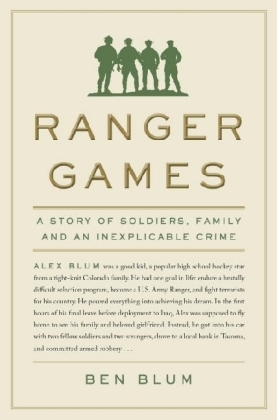
Ranger Games
Dday Gen Adult (Verlag)
978-0-385-54319-4 (ISBN)
Intricate, heartrending, and morally urgent, Ranger Games is a crime story like no other
Alex Blum was a good kid, a popular high school hockey star from a tight-knit Colorado family. He had one goal in life: endure a brutally difficult selection program, become a U.S. Army Ranger, and fight terrorists for his country. He poured everything into achieving his dream. In the first hours of his final leave before deployment to Iraq, Alex was supposed to fly home to see his family and beloved girlfriend. Instead, he got into his car with two fellow soldiers and two strangers, drove to a local bank in Tacoma, and committed armed robbery...
The question that haunted the entire Blum family was: Why? Why would he ruin his life in such a spectacularly foolish way?
At first, Alex insisted he thought the robbery was just another exercise in the famously daunting Ranger program. His attorney presented a case based on the theory that the Ranger indoctrination mirrored that of a cult.
In the midst of his own personal crisis, and in the hopes of helping both Alex and his splintering family cope, Ben Blum, Alex's first cousin, delved into these mysteries, growing closer to Alex in the process. As he probed further, Ben began to question not only Alex, but the influence of his superior, Luke Elliot Sommer, the man who planned the robbery. A charismatic combat veteran, Sommer's manipulative tendencies combined with a magnetic personality pulled Ben into a relationship that put his loyalties to the test.
BEN BLUM was born and raised in Denver, Colorado. He holds a PhD in computer science from the University of California Berkeley, where he was a National Science Foundation Graduate Research Fellow, and an MFA in fiction from New York University, where he was awarded the New York Times Foundation Fellowship. He lives in Brooklyn with his wife and stepdaughter.
PROLOGUE Most residents of Tacoma do not think of it as an army town. To visitors it presents as the scrappy kid sister city of Seattle, the coffee and arts mecca forty miles to the north with which it shares an airport. The notorious midcentury "Tacoma Aroma" from the paper mills has long since been filtered into submission. In its place are juice bars, outdoor supply stores, international film festivals. Every civic surface that hasn't been given over to kayaks and totem poles bristles with the spiky, membranous studio glasswork of homegrown sculptor Dale Chihuly. The only sign of Joint Base Lewis-McChord, whose more than 50,000 personnel make it Pierce County's largest employer by a factor of five, is the occasional Blackhawk helicopter beetling across the silhouette of Mount Rainier. In 2005, while Iraq spiraled into civil war and JBLM (then still divided into Fort Lewis and McChord Air Force Base) was dropping paratroopers over Afghanistan from its fleet of big-bellied C‑17 Globemaster IIIs, Tacoma's city council entertained a proposal for a 420-foot "Tower of Peace" to rival Seattle's iconic Space Needle. No one dared mention the base. "We want this to be really inclusive," the tower's leading champion told Tacoma's News Tribune. "Let a person form in their own mind what the concept of peace is." Five miles down I‑5 toward the giant blank on the map where JBLM nestles into the strip malls of Lakewood, Parkland, and Spanaway, a different America fades in, one that would be instantly familiar to residents of cities with less complicated relations to their servicepeople. Yoga bows down to CrossFit. Puffy North Face jackets disappear under Carhartt work coats and military surplus camo. All those boardroom-ready Dale Chihuly pieces give way to the very different glasswork at Tacoma Pipe and Tobacco. The Patriots Landing retirement home advertises to military personnel: You served us. Now let us serve you! Halfway down a block of auto dealerships and faded clapboard churches on South Tacoma Way stands a fieldstone-clad Bank of America that is popular with soldiers for its ease of access from I‑5. The facade is glassy and generic. A bed of purplish cinders houses a row of shrubs as boxy as green Legos. In back is a parking lot accessible from the alley, feeding to a bright red drive-through ATM. It is just a dreary little branch like any other, a squat corporate cipher in an unremarkable neighborhood close to base. At 5:16 on the afternoon of August 7, 2006, three men ran out of its front door screaming that it was being robbed. Bank robberies come in two essential varieties. In a "nontakeover" robbery, the bandit-still the term used for bank robbers by the FBI, which publicizes monikers like "Snub-Nosed Bandit" and "Surfer Bandit" for as-yet-unidentified repeat offenders-slips a note to a teller explaining in brief that he intends the teller harm and desires cash. Nearby customers may not find out a robbery has occurred until after it is over. The bank on South Tacoma Way, crowded with the after-work rush, was an example of the much rarer and more profound disruption of a "takeover" robbery. In a matter of seconds the bank left its old function behind. Building security features designed to protect the piles of $100, $50, and $20 bills from theft-thick concrete walls, bulletproof Plexiglas, clear lines of sight throughout the lobby-were now tactical assets for entrenchment and defense. Tellers and managers who had previously spent their days in service to the smooth operation of the bank now found themselves conscripted into its defilement. Meanwhile, outside the floor-to-ceiling windows, traffic continued to trickle by in the sleepy August sun. Two customers in turn pulled up to the drive-through ATM, inserted their debit cards, engaged in small transactions, and drove away. Those who had fled the bank had already run down the block and cros
| Erscheinungsdatum | 01.09.2017 |
|---|---|
| Sprache | englisch |
| Themenwelt | Literatur ► Biografien / Erfahrungsberichte |
| Literatur ► Briefe / Tagebücher | |
| Sachbuch/Ratgeber ► Geschichte / Politik ► Politik / Gesellschaft | |
| Sozialwissenschaften | |
| Schlagworte | army training • basic training • Brainwashing • Canada • combat veteran • court • Crime • Criminal psychology • Cult • Dr. Phil • Family • Guilt • Honor • indoctrination • math prodigy • Memoir • Phillip Zimbardo • Psychopath • Ranger • ranger creed • ranger indoctrination program • Robbery • sociopath • soldier • Stanford Prison Experiment • stanley milgram experiment • Tacoma • Tragedy • Trial • US Army Ranger • US Army / US-Armee • US Rangers • war • War Crimes |
| ISBN-10 | 0-385-54319-0 / 0385543190 |
| ISBN-13 | 978-0-385-54319-4 / 9780385543194 |
| Zustand | Neuware |
| Haben Sie eine Frage zum Produkt? |
aus dem Bereich


